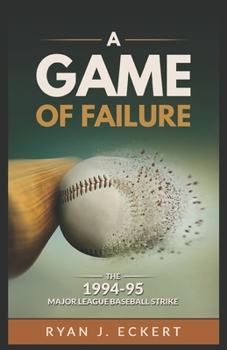A Game of Failure: The 1994-95 Major League Baseball Strike
On August 12th, 1994, the Major League Baseball Players Association directed its members to go on strike, ultimately leading to cancellation of both the remainder of the 1994 baseball season and the 1994 World Series. The 232-day saga that ensued, and its fallout, would ultimately amount to the most financially and emotionally destructive episode in the history of American professional sports. This book examines the 1994 strike from all angles, including its long-stemming origins to its beginnings, the course taken by events throughout its nine-month duration, and evolving popular reactions throughout. It will consider the eventual mediation and resolution, and what the strike meant in both the short- and long-term for Major League Baseball and the relationship between the sport and American culture. The labor dispute that culminated in 1994's strike and cancelled World Series was hardly the first dispute between players and owners in Baseball, but rather can be seen as a culmination of an extended period of labor unrest throughout the second half of the twentieth century. Here we see the "final showdown" in the owners' long-standing efforts to break the union; both sides would eventually accept concessions and, finally, the result would be normalization of the previous imbalance of power. Such a dramatic course correction would prove to have negative consequences for the public perceptions of both players and owners. Unlike previous labor disputes, 1994 was met with overwhelming feelings of resentment and betrayal aimed at both sides. Consequently, the 1994-95 strike was definitive in establishing the American public's modern conception of the relationship among professional athletes, team owners, and fans.
Format:Paperback
Language:English
ISBN:1549889370
ISBN13:9781549889370
Release Date:April 2016
Publisher:Independently Published
Length:164 Pages
Weight:0.60 lbs.
Dimensions:0.3" x 5.5" x 8.5"
Related Subjects
HistoryCustomer Reviews
0 rating





